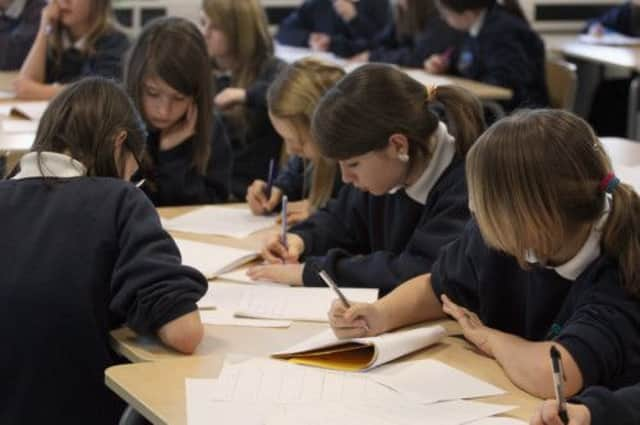Give top Scots pupils private funding - report


In a study commissioned by the Scottish Government, leading educationalist Professor Lindsay Paterson said philanthropy could be used to encourage the brightest and most able.
The report, which was published by the David Hume Institute, said Scottish education’s focus on offering equal opportunities had led to the most outstanding students being “neglected”.
Advertisement
Hide AdAdvertisement
Hide AdIt said bursaries could be set up using funding from private sources, which would help promote “truly outstanding” achievement.
The report said a national fund could be set up for the distribution of funds, however it noted that larger benefactors would want more control over how their money was spent.
The report was discussed at an event in Edinburgh last night where guests included Jim McColl, the billionaire chairman and chief executive of Clyde Blowers, who plans to open a skills college in Glasgow.
Commenting on the report, education secretary Mike Russell said: “While the state will always be the primary funder of state education in Scotland, philanthropy could have a role to play.
“About much more than just money, philanthropists offer dynamism, fresh ideas and energy that could work in the interests of all Scotland’s children and young people. It could help us reduce the attainment gap, something which this government has prioritised along with our commitment to free education.
“In Scotland we already have Curriculum for Excellence which addresses the individual needs of every child and seeks to
prepare them for the global jobs market. This should be an interesting discussion which I hope will foster ideas on how
to maximise the benefits of philanthropy in Scotland.”
In the report, Professor Paterson, of Edinburgh University, writes: “The reason to encourage the development of special gifts and talents in Scottish education is not that the very able are performing badly in the core curriculum by international standards: they are not; it is, rather, that Scotland ought to be enabling greater diversity of accomplishment and to be
stimulating achievement that is truly outstanding.”
Advertisement
Hide AdAdvertisement
Hide AdProfessor Paterson said money could be allocated in a way similar to the process already used for Lottery funding.
“Giving grants in response to competitive bidding would stimulate creative thinking among providers of opportunity to outstanding students, and would encourage diversity. The main criteria that would be used when deciding which proposals were worth funding would be that they could provide imaginative opportunities for truly outstanding students, and that they
would do so in a manner that was as equitable as possible without compromising on absolute standards of excellence. These national competitions would be overseen by a national board.”
But Alan McKenzie, acting general secretary of the Scottish Secondary Teachers’ Association, said many teachers would have reservations over the use of private money.
“Nobody gives money without expecting something in return, whether it’s publicity or a degree of control over how the money is spent,” he said. “We would be uncomfortable with that - we don’t want business interfering with what happens in our schools.
“Funding is a problem, but I’m slightly surprised that a left of centre government, as they declare themselves, would have an apetite for this.”